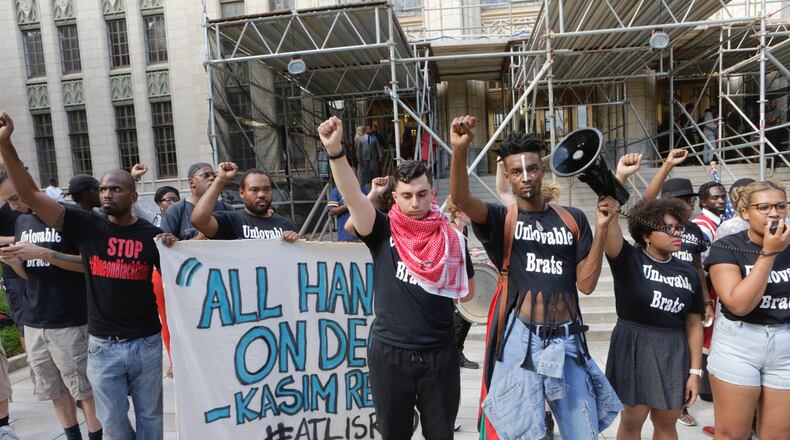Last week, Mayor Kasim Reed defused a Black Lives Matter protest outside the governor’s mansion by promising demonstrators a sit-down. At the time, I sensed this was similar to the old dating tactic men often employ for short-term gain: Tell the woman anything she wants to hear.
It worked — for the time being, at least. The protesters went home and returned this week to meet with Reed at City Hall for a “dialogue,” one that left them grumbling and feeling unrequited.
Still, I must say Hizzoner and his coppers played the matter well. After several nights of protesting, no one got hurt bad, arrests were relatively few and damage was kept to a minimum.
Atlanta was seen in national media as a place where protest could occur and heads didn’t get cracked or windows broken. Atlanta, cradle of the civil rights movement. It was an image the mayor burnished when he waded into protesters, evoked Martin Luther King Jr. and urged them to behave. Which they largely did.
Part of the winning formula was one employed by Police Chief George Turner in having police not arrive in riot gear. If you don’t start out antagonistic, then things are less likely to slide into chaos. The protests were about two black men (in Falcon Heights, Minn., and Baton Rouge, La.) getting killed by police, so optics were important.
That these protests occurred after five cops were ambushed and murdered in Dallas shows fortitude on the cops’ part.
“I want to commend the protesters; they conformed to the rules we laid out and were not violent,” Chief Turner told me this week. “Look at the photos of the crowd at Williams Street (where cops kept demonstrators off the interstate). You didn’t see officers who were tense or ready to explode.”
Turner came to his post with Reed in 2010 and has overseen a 30 percent overall drop in crime. It’s often said that you can’t arrest your way out of a crime problem and Turner has seemingly taken that to heart. Arrests are down 22 percent since 2009 and drug arrests are down 40 percent. (National crime and arrest figures, too, are down substantially.)
Atlanta’s trend caught the eye of the Christian Science Monitor, which last year published an article headlined, “How police can get it right: Atlanta police chief George Turner is building a diversified department that’s less reactive and more human and could offer lessons after Ferguson.”
The force, according to 2013 figures, mirrored the city’s demographics, which is somewhat unusual in policing: 57 percent of Atlanta cops were black and 52 percent of the population was black; 37 percent of the cops, like the population, were white.
Credit: Curtis Compton
Credit: Curtis Compton
After coming in, Turner did away with the Red Dog squad, the paramilitary badasses formed decades ago to smash druggies who had taken over the streets during the crack epidemic. Turner formed the APEX unit (cops love acronyms and the term “proactive” is part of its name), which couples data-driven policing with old-school gumshoe tactics to target repeat offenders.
“We’re not trying to criminalize so many young people who would have been arrested for minor violations we are simply not making now,” Turner said.
But while crime is down this year, violence is suddenly up. Homicides have increased 22 percent from last year (51 to 62) and shootings 7 percent.
Three weeks ago, police announced “Operation Whiplash,” which meant certain neighborhoods that are seeing more shootings would see more cops.
One of the demands protesters have made is to end that operation, as well as to increase police training and use revenue from fines for arrest intervention programs.
“If the only way we can address crime is to deploy more police, then we have the wrong agenda and the wrong diagnosis,” said Mary Hooks, an organizer of the local Black Lives Matter chapter.
She said the mayor snookered the activists into pulling back their protests. They will return, she vows.
Turner waves off the notion of pulling back: “I have had conversations with the citizens in those communities besieged with the violence we are trying to prevent, and there’s not a single individual saying, ‘Don’t police our communities.’”
Dan Grossman, an attorney who filed suit against the APD after police acted like a goon squad in a 2009 raid of The Atlanta Eagle gay bar, gave the department mixed marks on its performance.
“One can fairly say we have a better situation than other cities,” he said. “I’m grateful we’ve not seen the number of (police) shootings of other cities. Also, they’ve been more restrained in recent protests than they were in handling past protests.”
But then Grossman, who is part of a court-ordered monitoring of the force, added: “We have a problem in training, in discipline, and with cops who need to be fired staying on the force.”
The problem is an exodus of veteran cops because of the relatively low rate of pay, he said, echoing the police union: “If the mayor and City Council is not going to pay them, well, you get what you pay for.”
About the Author
The Latest
Featured




